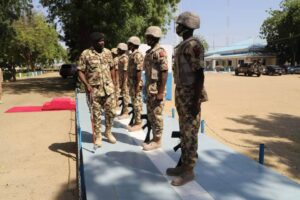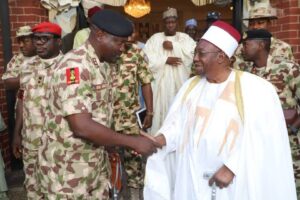By Lawrence Audu
American statesman, General Colin Powell was right in one of his writings on leadership when he said: ” Great leaders are almost always great simplifiers, who can cut through argument, debate and doubt, to offer a solution everybody can understand.” This is also true of the Chief of Defence Staff, General Lucky Irabor under whose dynamic leadership we see a strong synergy of among service chiefs working round the clock to surmount the security challenges the nation faces. Top Commanders in the Armed Forces with impeccable track records have also at different periods have been deployed to head critical missions with attendant successes.
As the nation continues to battle threats posed by non-state actors and criminal elements, the military recently redeployed some senior field commanders across all theatres in a bid to consolidate on the successes achieved. One of them is Major General Ibrahim Sallau Ali who takes over from Major General Chris Musa at the North East Joint Operations Theatre, Operation Hadin Kai as Theatre Commander, in Maiduguri, Borno State.
By now, the name Major General Ibrahim Ali would not come strange to many following his exploits and experience in the Army and only recently as General Officer Commanding the 3 Division of the Nigerian Army while at the same time, Commander of the Joint Special Task Force, Operation Safe Haven which Areas of Responsibility span across Plateau, Bauchi and Kaduna states. That jurisdiction has been the epicenter of one of the worst ethno-religious conflicts for more than 20 years. Since September 7, 2001, when Jos lost its innocence following the outbreak of violence in the one serene city, leaving thousands dead in its wake, successive administrations over the years have pondered on the possible ways of finding not just a lasting solution, but to ending the cycle of violence. This continued until the Armed Forces of Nigeria considered the establishment of Operation Safe Haven, a military task force set up to maintain peace in Plateau State in 2010.
General Ali, whose sojourn in Jos has been very impactful in changing the situation for the better, deployed a non-kinetic/civil-military approach where necessary. We now see a people more committed to peace than ever before with several sessions of dialogues carried out in most of the affected communities to build confidence, Civil Societies were from time to time called upon to engage communities, while routine cultural festivals brought all peoples of diverse faith, creed and ethnicity brought together to interact. In a bid to keep the youth away from crime and violence, sports competitions were organized frequently which served also as a talent recruitment avenue from where many youths have found themselves living their dreams.

A successful military onslaught led by troops of Operation Safe Haven in Plateau and Kaduna States, under the Command of General Ali also led to the recovery of 517 small Arms and light weapons from bandits and criminal elements. All these in addition to the arrest of countless criminals, rescue of kidnap victims as well as nipping in the bud potential breakdown of law and order through intelligence gathering.
Born on 16 November 1970 in Nasarawa Kano State, Nigeria, General Ali started his educational pursuit in 1974, at Lebanon Primary School Kano, before proceeding to Saint Thomas Secondary School in 1980 also in Kano State. He began his military career at the Nigerian Defence Academy as a member of the 39th Regular Course in 1987 and obtained a Bachelor of Science degree in Geography from the Nigerian Defence Academy in 1991. He was nominated in 1992, to complete his cadet training at the Royal Military Academy, Sandhurst, in the United Kingdom. He was a member of the Standard Military Course 922 at the Royal Military Academy. At the end of his course, he was awarded the Silver Bugle for being the best athlete among all the British and foreign cadets during the course. Ibrahim was commissioned second lieutenant into the Nigerian Army Armoured Corps in April 1993.
The senior officer attended several military courses including; Young Officers’ Course Armour, Regimental Intelligence and Security Officers’ Course, Basic Range Management Course, Anti-Tank Platoon Commanders’ Course amongst others both home and abroad. Among the 12 graded courses attended by Major General Ali, he was the best in order of merit in 7 and second best in 2 of the courses. During his National Defence Course in 2014, he was awarded the Inspector General of Police prize for writing the best research paper on Internal Security Operations.
General Ali also held several positions in the Army which include, Commander, Rapid Deployment Force under the ECOWAS Monitoring Group Task Force ECOMOG in Monrovia, Liberia and in Sierra Leone, Platoon Commander, 5 Battalion. The operational terrain of the Northeast would not be strange to the new Theatre Commander who has also served in Operation FLUSH OUT 1 Multinational Joint Task Force in Baga Borno state and Acting Commander Sector 2 Operation LAFIYA DOLE in Yobe State. From his experiences General Ali is a war-tested General who has not only seen real-time combat, but excelled in the battle.
As General Ibrahim Ali takes Command in the Northeast Theater of Operations, there is no doubt that he would hit the ground running to continue from where his predecessor, General CG Musa stopped. General Musa who now Commands Infantry Corps of the Nigerian Army in all fairness will be remembered as one of the most successful TCs, under whose Command Troops welfare was given adequate priority with high morale as the troops went about rooting out insurgents from their hiding. Many terrorists surrendered to troops while many kidnapped victims including a number of Chibok girls were rescued during his time.
Expectedly, on assumption of office, the Theatre Commander has begun expanding on the existing synergies with visits to units and formations within his Area of Responsibility where he commended the Air Component for the crucial roles being played in support of the operation and requested for its sustenance in order to record more successes in the fight against the insurgents while paying special tribute to Fallen Heroes at the Memorial Wall. The visits which were also extended to other critical stakeholders including traditional institutions provided the opportunity to seek royal blessings and support of the traditional institution in order to win the hearts and minds of the locals in the ongoing Operations in the Northeast.

The Theatre Commander as a human will likely not have all the answers to all the expectations and yearnings of all Nigerians who would like to see the end of this war and have their soldiers returned to the barracks therefore, he is expected to establish a framework for continuous dialogue and constructive feedback. Nigerians are equally eager to see physical readiness training, preventative maintenance, battle rhythm meetings, and field training after-action reviews within the theatre.
Despite the successes recorded in the past and the combined efforts of all components including the Multinational Joint Task Force MNJTF, General Ali is expected to bring to bear his experiences while prosecuting the war on through both Kinetic and Non-kinetic means. And if the insurgents fail to surrender, the Theatre Commander would be left with no choice than turn on the heat on them.
